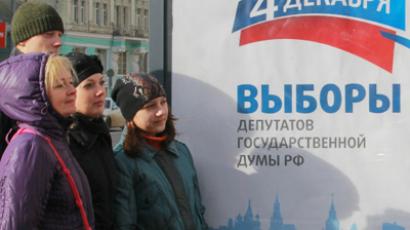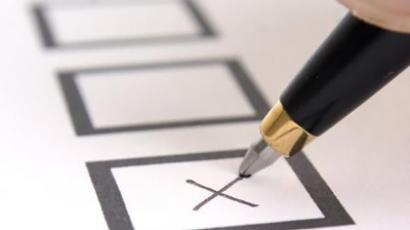Preliminary results: United Russia wins with 50%, loses parliamentary majority
With almost all the votes counted in the parliamentary election, Putin-led United Russia has received the support of fewer voters than in 2007, but still remains the biggest party in the Duma.
According to the Russian Central Election Commission, the United Russia got almost 50 per cent of the votes, the Communist Party (KPRF) is second with 19 per cent, followed by Fair Russia with around 13 per cent, and the LDPR with a little under 12 per cent.This means that currently the United Russia can expect to have 238 representatives in the lower house, KPRF 92, Fair Russia 64, and the LDPR may get 56. For Putin’s party this result is something of a setback. The opponents, on the contrary, will increase their representation in the parliament.Liberal party Yabloko (which got slightly more than 3 per cent), the Right Cause (with about 0.6 per cent) and Patriots of Russia (with a little less than 1 per cent) are likely to remain outsiders since none of them managed to cross the required 7 per cent threshold and make it into the State Duma. The final official results are yet to be announced but it is unlikely that the situation will change dramatically. What seems to be clear now is that the support for United Russia has declined for the first time since it was created in 2001. The chairman of the party, Vladimir Putin, who cast his ballot early in the afternoon, was asked at the polling station what he expected from the elections. "A good result for United Russia," he told journalists.All in all, seven registered political parties were taking part in the elections on December 4. The front-runners, United Russia, the Liberal Democrats (LDPR), the Communists and Fair Russia, had representatives in the Duma of the fifth convocation, which held its last session on November 23. Yabloko, the Right Cause, and the Patriots of Russia are only hoping to get seats in the 450-seat parliament. Voter turnout varied depending on the region, with the North Caucasus traditionally being rather active, with citizens of Central Russia, including Moscow and St Petersburg, having less enthusiasm for casting their ballots. The overall voter turnout so far is estimated at 60.2 per cent, as announced by the Central Election Commission. This would appear to be lower than the 63.71 per cent turnout in the 2007 poll, although final figures are yet to be determined.United Russia's lead comes as no surprise to anyone. Nevertheless, the once mighty political force has lost points compared to 2007’s Duma elections when it scored a landslide victory with over 64% of the vote and got 315 seats in the parliament. Recently it has often been subject to criticism for its inability to curb corruption or to narrow the huge gap between the country’s rich and poor, and for political and economic stagnation. However, United Russia has hit back saying that it is a party of action and that its course has proven to be good for the country. President Dmitry Medvedev, who tops the United Russia list for the election, noted earlier last week that changes in Russia are obvious. He admitted though that there are still many problems and that much has to be done. "We are not ashamed going into the elections,” Medvedev pointed out speaking at his and Putin's meeting with supporters.Last month the president stressed that United Russia is “an efficient party which has taken responsibility both for the economy and social care system, and for the safety of our citizens, and for our wellbeing.” “We never promise the impossible, but we always do what is possible. We’ve had successes and we’ve had decisions that have not been implemented to the full. Of course, we’ve made mistakes and we deserve criticism for them. But it's only those who do nothing that make no mistakes. We are a party of action and, whatever some say, we have done quite a lot. It’s a fact you cannot deny, and that’s what makes us so strong,” he said.
Prime Minister Vladimir Putin’s spokesperson, Dmitry Peskov, told RT the United Russia Party is satisfied with the result, even though its popularity has dropped.“We have to remember that [the United Russia] party was a ruling party in the country during a very harsh and tough period of the last four years, a time of unbelievable economic crisis and the party managed to minimize the consequences of this crisis together with the government. But certainly a party cannot satisfy everyone in this country. Though it lost some percentage, it proved to be the leading political power in the country,” insists Peskov.
Igor Khokhlov from the Institute of World Economy and International Relations believes it would be incorrect to state that something went wrong for United Russia.“Back in 2007, United Russia and its leader Vladimir Putin were considered to be the force that led Russia from the [chaos] of the 1990s, and, actually, Vladimir Putin effectively fought [the] consequences of the collapse of the Soviet Union and economic problems Russia experienced back in [the] 1990s,” he told RT. “But now, a new generation of people is coming to vote – those who grew in [the] 2000s, and they have never seen economic problems… they consider this absolutely normal, and they have different demands, and that’s why the political spectrum is widening.”














